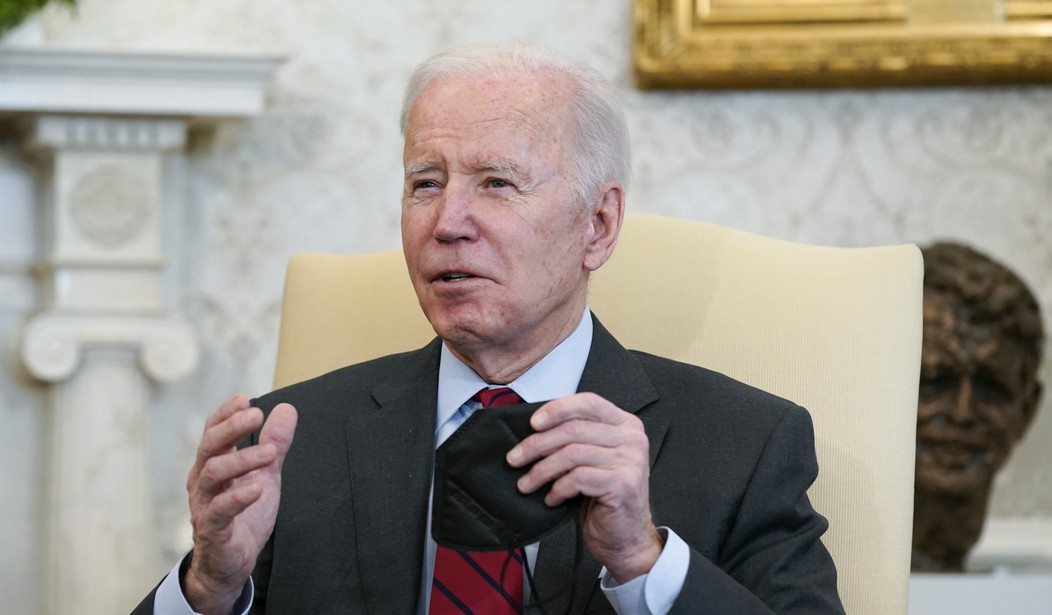I kid, I kid. Quinnipiac does not describe this result as a rebound, although it does represent a slight tick upward from their previous month’s 33% job approval rating for Joe Biden. It’s still below 40%, and this result tends to indicate that the normally Democratic-leaning pollster didn’t hit an outlier in its series in January’s disastrous poll reading:
While 35 percent of Americans approve of the way President Biden is handling his job as president, 55 percent disapprove, and 9 percent did not offer an opinion. This compares to a January 12, 2022 Quinnipiac University Poll when 33 percent of Americans approved of Biden’s job performance, while 53 percent disapproved, and 13 percent did not offer an opinion.
In today’s poll, among registered voters, Biden receives a negative 37 – 56 percent job approval rating with 7 percent not offering an opinion. In January, among registered voters, Biden received a negative 35 – 54 percent job approval rating, and 11 percent did not offer an opinion.
That’s a net -20 among all respondents, and a net -19 among registered voters. His aggregated average at RealClearPolitics shows a net -12 today, including the Q-poll results here, so Quinnipiac tends toward the outlier position still, but not by a lot.
Furthermore, Biden’s still underwater on every measure in this poll:
- COVID-19 response: 43/53
- Foreign policy: 35/54
- Ukraine crisis: 34/54
- Gun violence: 24/62
- The economy: 33/61
- Supreme Court: 40/45
This data brings up a couple of points to consider. First, the Supreme Court opening should have been an opportunity for Biden to get a little bounce with a decisive and historic pick. Instead, Biden’s dithering while his allies fracture over the potential candidates, and it appears that Biden’s unprepared for this opening.
The economic numbers speak for themselves, and probably are the biggest policy concern for fellow Democrats as the midterms approach. However, the biggest “tell” in these numbers is the lack of bounce on foreign policy in the midst of the Ukraine crisis. In all fairness, Biden’s probably doing a passable job playing a losing hand here, at least lately now that Nordstream 2 is back on the table as a sanctions target. The lack of a bounce in support in the emergence of a foreign-policy crisis, even in the specific handling of the crisis, demonstrates that Americans have dispensed with any benefit of the doubt on Biden. This is almost certainly a result of Biden’s dishonest and disgraceful retreat from Afghanistan and abandonment of Americans and allies to the Taliban.
Biden forfeited any claim to a benefit of the doubt in August after promising not to leave until Americans could all get out. Now his credibility is shot, and with it any sense of confidence in his leadership, which is why Biden’s not getting a rally effect. (I talked briefly about this with Drew Mariani on his Relevant Radio show yesterday, too.) That will make Biden an enormous albatross in the upcoming midterms unless he can somehow re-establish credibility with voters, but thus far he’s still only offering vague platitudes and reactive measures. Biden has earned this confidence-crisis cascade, in other words.
Quinnipiac is pushing another set of results from this poll today, however. When asked whether Mike Pence or Donald Trump got it right on the VP’s power to overturn an election, respondents overwhelmingly chose Pence, including a majority of Republicans:
After former President Donald Trump told a crowd that former Vice President Mike Pence could have overturned the 2020 presidential election, Pence responded by saying that Trump was wrong and that as vice president, he had no right to overturn the election and most Americans agree with Pence. Roughly 7 in 10 Americans (72 percent) say Mike Pence’s view is closer in line to their way of thinking, while 17 percent say Donald Trump’s view is closer in line to their way of thinking.
Among Republicans, a slight majority (52 percent) say Pence’s view is closer in line to their way of thinking, while 36 percent say Trump’s view is closer in line to their way of thinking.
Alternate headline: Majority of Republicans live in reality. It’s an interesting result, perhaps a demonstration of Trump’s waning influence over the party. Choosing reality in this case means specifically disagreeing with Trump and at least a part of his victimization claims regarding the election. It’s probably not going to help Pence much in the GOP primary, whether or not Trump runs for the nomination again; he’s crossed the MAGA base by calling such a claim “un-American,” and he’s too close to Trump for the rest of the party. It is interesting, though, to see the functional limit of the MAGA base and what that might mean for a fusion candidate like Ron DeSantis in 2024.








Join the conversation as a VIP Member